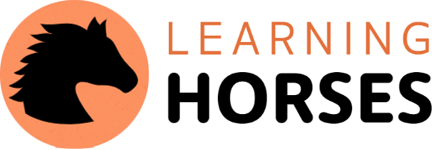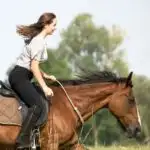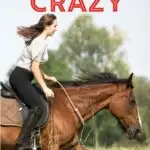Many parents feel bewildered when their child, seemingly out of nowhere, begins “obsessing” over horses. The “horse crazy phase” has almost a mythological status as something that can be predicted to come and go as “just a phase,” but, just like any developmental phase for kids and teens, attuned parenting invites us to connect with our child where they are instead of ignoring or waiting for it to pass. In this article, we’ll explore what draws girls to be “horse girls,” how parents can affirm (even if they can’t afford horse sports), and how to connect with our horsecrazy child or teen.
Even if we can’t fulfill all their desires, there are ways to encourage kids’ passionate interests while supporting emotional development and the development of diverse healthy interests. In this article, I’ll be referring to horse-crazy kids as girls and young women. While there are certainly boys who are drawn to horses and horsemanship, it’s predominantly young women who are drawn to horses and equestrian sports– for reasons I will discuss in this article.
As a masters-level trained mental health professional who works often with children and adolescents, and a grown-up former “horse girl” myself, I’m excited to have the opportunity to speak to this topic from both my own experience and my professional training.
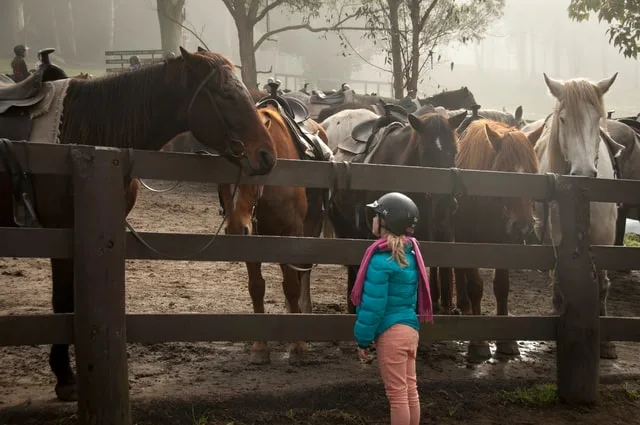
Why do girls get horse crazy?
There’s a lot of theories on why horses and young women connect so well, but no one really understands why this connection is so common. I think research into equine-assisted psychotherapy actually gives us a lot of insight: we know that horses are highly emotional creatures that bond deeply with handlers and provide a totally authentic experience.
I believe girls are drawn to horses for many reasons, but this is one of the biggest: total authentic unconditional acceptance. For girls growing up today, social “success” requires a lot of “faking it,” masking true feelings, and figuring out complex social rules for groups and one-on-one friendships. Additionally, many girls benefit from how empowering it is to be a horseback rider, and may feel intuitively drawn to the ways in which horses can be psychologically an official. Horses can improve self-worth and body image, and a girl’s own drive to feel better about herself may motivate her to pursue equine sports.
Unfortunately, culture as a whole doesn’t actually like empowered women. In addition to the many positive benefits, Horse sports can expose a girl to bullying due to the “horse girl” stereotype.
When should I be concerned about my horse obsessed daughter?
For some girls, horses may just be a casual interest, but for other girls, the horse crazy phase can actually move into what could clinically be considered an actual “obsession”
When we consider the difference between a passionate interest and an obsession, one of the most important markers to look for is “psychological distress”. Is it unpleasant for the interest to take up as much space in her mind as it does? Are thoughts about horses intrusive, interrupting when she’s occupied with other things? Is she able to shift attention when she wants to?
As a parent, a kid going through a horse crazy phase isn’t something to be “waited out.” Stay present and supportive, even if you are very tired of hearing about horses.
You may wish to consult with a mental health professional if your own response creates conflict in the parent-child relationship, if:
- your daughter experiences significant distress over her thinking patterns,
- you notice her hyper-focused interest interrupting her ability to develops normal social relationships with peers.
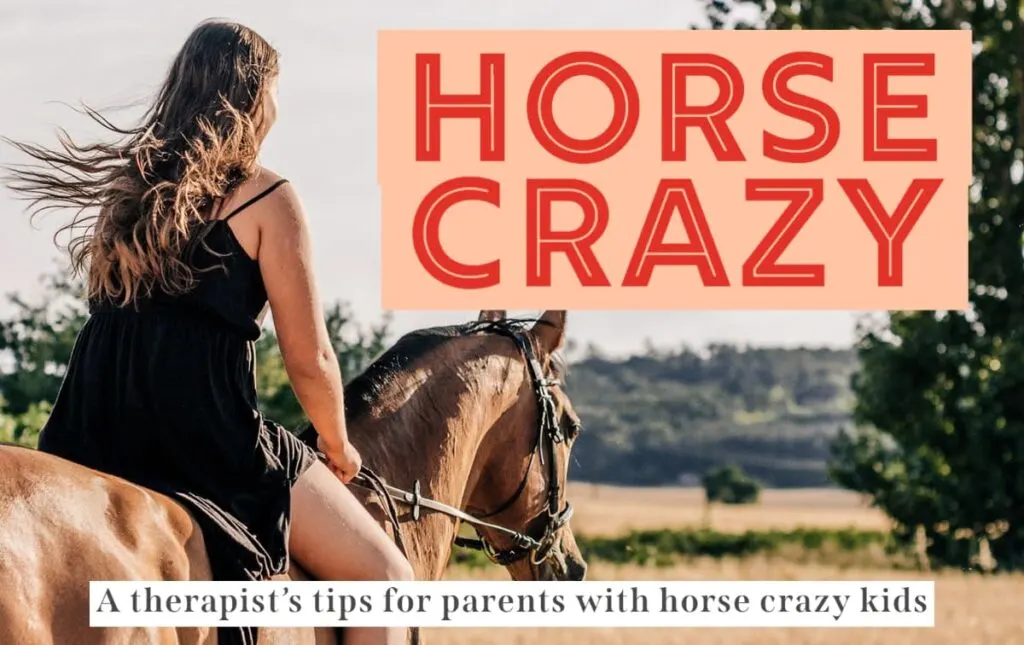
How do I parent my horse crazy kid well when we can afford horses?
You aren’t alone, and you haven’t done anything wrong if you are able to make it possible for your daughter to have her own horse. To parent a horse crazy kid well starts with showing interest.
Don’t change the topic or ignore your daughter when she speaks– seemingly endlessly– on the topic of horses. As much as you are able, listen, ask questions, and pay attention to what really might be being said.
In endlessly- and exclusively- talking about horses, your daughter may actually be telling you that she doesn’t feel comfortable talking to you about anything else, or that nothing else in her life feels as important or as exciting as this one thing. Listening well to what she does have to say may help build a relationship that can support other conversations.
Growing Up Horse Crazy
Since, in the introduction of this article I promised to share a bit of my own experience, here’s my story as a former horse crazy kid and how, looking back now as a mental health professional, I wish that my parents would have responded:
For me, my horse obsession appeared in fourth or fifth grade, peaked in seventh grade, and mostly went underground by the time I was midway through high school. After getting my first real job after college, I bought my dream horse– a rare Bashkir Curly. I owned, bought, sold, and bred horses for about 10 years after that, before selling everything to move to Seattle for graduate school and a life transition that left my time with horses more limited but still an important part of my life.
Looking back now, I can see that as a very troubled kid, I became attached to a sort of magical thinking in which I believed that if I had a horse I could feel okay. My endless talking about horses was motivated by thinking if my parents knew just how much I wanted a horse, and how much I knew, and how “prepared” I was to take care of a horse, they would make it happen despite limited means.
As an adult now who has done a lot of my own personal work in my own therapy, I realize that attaching to that idea was a substitute for not having a safe person to attach to or other outlets to get care. I believed that a horse could somehow save me. Today, as an adult and a mental health professional who works with teens, I think young me was at least partly right: I do believe that horses could have provided some psychological support that I, as a kid without access to a counselor or therapist, didn’t have a way to get.
